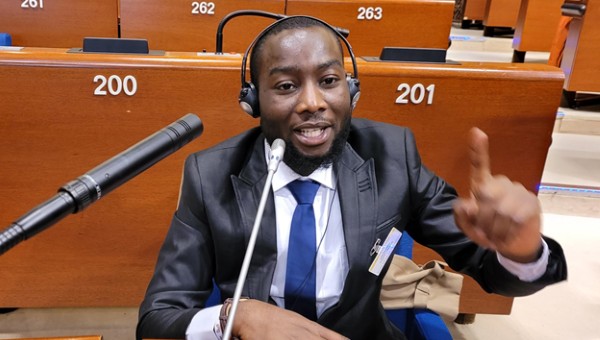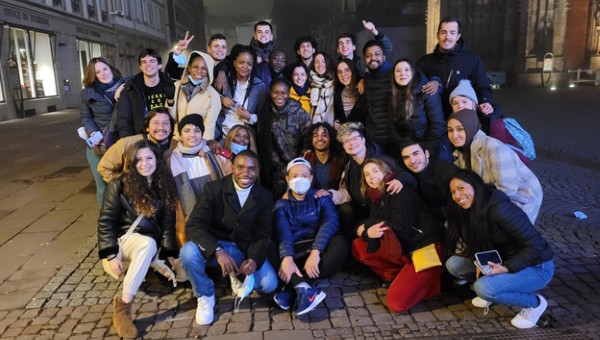How democracy can save the environment
Amaraizu Genius is an International Student Ambassador at Södertörn University, Stockholm and a 2020 Swedish Institute scholar in Media, Communication and Cultural Analysis. He joined other global youth and world leaders at the World Forum for Democracy in France (8–10 November 2021) to discuss the theme: Can Democracy Save the Environment?
.jpg)
By Amaraizu Genius
When I received the invitation by the Council of Europe to join youths, global leaders, activists, scientists, politicians and other stakeholders in this year's World Forum for Democracy, I started reflecting on the theme and more importantly, how Sweden has changed me. As a top oil producing country in Africa, in my country Nigeria the environmental discourse is not new. In fact, a number of activists have paid with their lives over protests against environmental destruction especially in the oil producing regions. The need to protect the environment has always been a neglected urgency. However, I am happy now. I am happy that citizens are taking charge, and most happy that young persons are leading and have taken up the cross to push for the survival of our planet across different countries.
People who argue that democracy is failing to tackle the climate crisis may have a point. While these arguments rage, it is relevant to put it into context. The argument usually refers to the slow pace in decision making in democracies which of course is a risk in times of crisis. Many also argue that the public could not be trusted to decide in times of crisis, and evidently COVID-19 global panic and response fits as a perfect example. However I would love to think differently, just like Rebeca Willis inferred, I agree that the problem is not too much democracy, but rather, too little democracy.

Photo: Amaraizu Genius
The World Forum for Democracy plenary sessions presents three questions: National governments, international organizations, or the citizens: who is setting the pace?; What governing style is best placed to tackle the environmental challenge?; Public or private: what role for which sector?
Without thinking twice, I argue that wherever citizens control the direction, decision and engagement, that is the right answer. Democracy allows all hands to be on deck, there's no other form of governance or government that guarantees such. It may be true that it takes time, yes, but the facts on ground show that we are better off with democracy. You may want to compare with undemocratic nations to understand what I'm talking about. Too little democracy is the problem. That's it. We need more acceptance, integration and encouragement to citizen participation. This is something COVID-19 should have taught us. But it seems we didn't learn. Citizens in many democratic States still rebel against the COVID-19 vaccine and the reason is simple: there is too little democracy; they are not involved or enlightened enough; they are not integrated into the processes to champion the fight. Of course, citizens don't replace the scientists or the doctors, but when solutions are forced down their throats it never works, not in democracy, and definitely not in undemocratic States. The citizens' role is the central point to our success in a crisis. When citizens lead, grassroots movements become visible. See what is happening at the COP 26 in Glasgow — the youths, global citizens are strengthening the call for climate action. Citizens' actions are impacting greatly on the responses, pushing the narratives and directing responses from national governments and international organizations. When citizens are part of the solution, there will be no one to challenge blindly the facts on need to protect the environment. This does not mean that there will be no deviants among the citizens, either caused by ignorance or misinformation, but rather, citizens involvement allows a stronger citizen engagement and citizen led awareness.

Photo: Amaraizu Genius
Citizens have answers that have long been neglected or suppressed. This is a reality even in democratic States, I repeat, we are suffering from too little democracy. In a group task with fellow young persons during the pre-conference moments of the World Forum, we analysed the speech of Brianna Fruean, a Samoan climate activist and member of the Pacific Climate Warriors delegation at COP26 and we couldn't agree more with her perspective. The truest form of victory in saving the environment can only be possible through contextual integration of diverse knowledge systems. You may want to call it citizens' knowledge or the indigenous peoples' knowledge. Importantly, we must raise the consciousness of a new form of colonialism against world citizens perpetrated by governments and big companies. It is called climate colonialism, in which rich and powerful exploit, pollute and profit from the destruction of the earth. Traditional politics have excluded indigenous communities on one hand, and have failed in achieving inclusion of citizens on another hand. Social justice seem far fetched with these big entities not taking responsibility for their actions. Invaluable indigenous expertise is missing, invaluable citizen-led solutions are missing and invaluable citizen's initiatives are not adequately promoted.
After moving to Sweden, from Nigeria, I couldn't help but appreciate the level of citizen-led actions to protect the environment. Little things matter, of course, citizen participation does not just entail citizens' inclusion in decision making or activism but the enabling ground that allows citizens to recycle and reduce waste, the enabling environment that allows citizens to have options in food, or the options in clothing and other basic needs. Sweden indeed changed me, and I couldn't have had a better motivation than seeing what citizens do for the environment. In fact, I was so motivated to lead the environmental discourse that I took up an internship with the United Nations as a Programme Support (Media & Communication) at the Secretariat of the Convention on Biodiversity, Montreal, Canada. We need more democracy. Sweden needs more, and of course, this extends to the whole of Europe and other Western nations. Nigerian democracy is young, and since we agree that environmental problems are transboundary and its protection is a global pursuit, we can't leave anyone behind. Global leaders must put a strong interest in supporting the growth of democracies in Africa and other developing nations. The question should not be, "Can Democracy Save the Environment," but rather, "How can we Strengthen Democracies to Save the Environment."

Connect with Genius on LinkedIn: https://www.linkedin.com/in/amaraizugenius External link, opens in new window.
External link, opens in new window.
Page updated
12-11-2021

